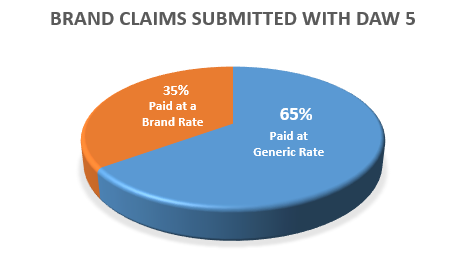Understanding the importance of DAW codes, how they could be eating into your profits and what you can do about it.
To understand why Dispense as Written (DAW) codes are important, let’s first understand what a DAW code is and the impact it has on pharmacy billing.
A DAW code specifies the prescriber’s instruction for dispensing a specific medication or allowing the substitution of a generic equivalent. The code submitted (by the pharmacy) within the claim will factor into how the third-party payer reimburses or pays the pharmacy for that prescription claim.
When the DAW code is missing, invalid, or incorrect, it may have a negative impact on the pharmacy as well as the patient. Below are a few examples:
Reimbursement Rate – Invalid or inappropriate DAW code usage may result in generic rate payments of brand-name drugs, which may cause losses for the pharmacy
Formulary Selection – Dispensing drugs that are not on the payer’s formulary list may result in higher copays for the patient, as well as generic reimbursement to the pharmacy on brand-name drugs
Claim Rejections – Missing or invalid DAW code rejections cause extra processing time and rebilling in the pharmacy, along with workflow interruptions and delays in the delivery of patients’ medication
Audit Triggers – If the pharmacy is audited with insufficient documentation to support their DAW code usage, the third-party payer can take money back from the pharmacy at a later date
Download the Net-Rx DAW Code Reference Chart to see common Dispense as Written codes and definitions, common use scenarios as well as the expected third-party payer outcomes. Read More >>










